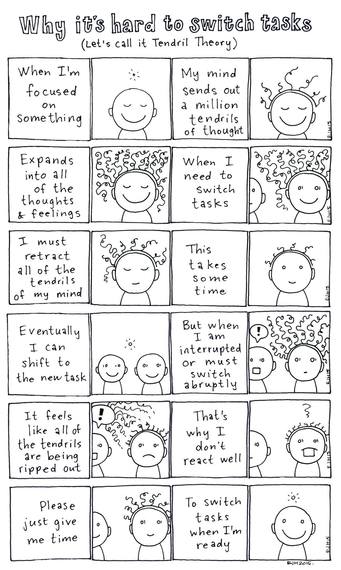A dear mama in my Evolve program posted this insightful piece by Human Illustrations on our private Facebook page and I was thoroughly taken with it.
While this comic was not specifically drawn to only represent children, many parents in my community have connected to it. That is because it helps provides a visual of the experience of shifting gears, something that can be particularly hard for certain people. It also explains why slowing down transitions is so important. Especially this time of year when families are heading back to school and adjusting to all the new people, new teachers, assignments, schedules, homework, etc.
**Heartfelt thanks and all credit goes to Human Illustrations and Erin Human for this wonderful illustration! Erin drew this about herself: an autistic person, an introvert, who has ADHD, and she is an adult. This comic was not intended to describe only children - as it does apply to many kinds of people, of all ages, whose brains are hard wired to work this way. I am grateful that she shared this with the world. Perhaps it speaks to how your brain works. Perhaps it helps you appreciate and give space to the people around you. I hope that this serves as a reminder and tool to give space to all people (and yourself) to honor the tendrils, however they may look.
If you have a developing person at home, here's how it things may go down...
You make a request. Nothing. You make it again. Still no response. You start to raise your voice. Still, crickets. Eventually, you are full-on freaking out and THEN everyone gets moving!
Ugh. Sound familiar?
In those moments, it can feel like they are flat out ignoring you when you ask them to brush their teeth, pick up their rooms, do their homework, put on their shoes, come to the table, get in the car, etc. and all this perceived heel-dragging can monumentally trigger you. It feels like they are ignoring you, acting disrespectfully and purposefully trying to drive you mad.
But...
What if they are not actively ignoring you?
What if they are not being willful or disrespectful?
What if they are not trying to make you crazy?
What if they are attending to something that is really pertinent to their experience/interests/evolution?
What if they are fully invested and inspired by what they are doing? What if these moments give them space and safety?
What if switching gears and doing what you want them to do requires a little more time for the de-tendrilling to take place so they can shift their focus and hear your request?
When we can hold the understanding of "tendril theory" in mind, we can work to honor the people around us as we still seek connection and cooperation. Here are some steps to experiment with when you create accepting space for the Tendril Theory.
- Before you even open your mouth to make the request...slow yourself waaaaaayyyyy down.
- Take a deep breath (actually take at least four deep breaths).
- Count to 10.
- Check in and see how you are feeling (Calm? Anxious? Annoyed? Relaxed?)
- If you are anxious, annoyed or angry, take another few breaths. Move your body. Perhaps step out of the room and wash your face.
- Walk over to them. (This is critical. Shouting your request from the other room is rarely going to get you what you want, and going to block the feeling of safety and connection.)
- Take a moment to notice what they are doing before saying anything. Just notice and honor that they are fully invested in what's happening for them in that moment.
- Depending on the neurostate of your child, look them in the eye and connect before saying a word. If making eye contact is not what is best for the child, use concrete statements, "Maria, I am sitting on the floor next to you to watch you play."
- Offer them a word of kindness or appreciation. "I can see you've worked hard on this drawing." or "You really love that game!"
- Once you feel like you've connected, kake your request.
- Speak in a quieter voice than usual. If you really want to be heard, whisper.
- Ask for a confirmation that the message was received.
- Say thank you.
- Walk away.
- Give them at least 30 seconds (ideally, one to two minutes) to shift gears, and honor their request if they ask for more.
I can't promise this will work every time but I guarantee that if you experiment with it, you will see something different happen and it's likely you will appreciate the outcome.
Give it a try!
Bottom line, yes, you need things to get done and the people around you aren't always tuned into your needs/desires because they have their very own. Go gently, be patient, make a little extra space and remember no smaller human is actively trying to make the people responsible for their well-being crazy. It just feels like that some of the time. ;)
With love,
Carrie Contey
